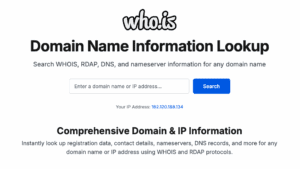When a domain seller discovers that a well-funded company or prominent individual is behind a purchase inquiry, prices skyrocket. Anonymous domain registration and acquisition protects both your privacy and your negotiating position. This guide covers every method for buying domain names anonymously — from WHOIS privacy services and proxy registrations to professional domain brokers who conduct stealth acquisitions on your behalf. Whether you’re a startup protecting strategic plans, a corporation preventing price inflation, or an individual concerned about personal privacy, these techniques ensure your identity stays confidential throughout the entire domain acquisition process.
Last updated: 15 October, 2025.
Want to buy a domain name anonymously? You’re not alone – when the stakes are high, business buyers often want to stay out of the limelight. NameExperts.com Director Joe Uddeme explains how it’s done.
What is Anonymous Domain Registration?
Anonymous domain registration is a service that allows individuals and businesses to register a domain name without revealing their personal details in the public WHOIS database.
Instead of displaying the domain owner’s personal information, such as name, address, and contact details, the registration uses generic proxy details.
This approach provides an additional layer of domain buying privacy and security, ensuring that your personal information remains confidential.
Understandably, it can be a very attractive option when trying to buy a premium domain name.
Adding domain privacy can anonymize ownership details in the WHOIS database – which helps keep your name out of the picture.
Anonymous domain registration is particularly valuable for protecting personal information, preventing unwanted solicitations, and maintaining confidentiality in sensitive situations.
Key takeaways:
- Anonymous registration comes with many benefits
- Understand the role of WHOIS and regulatory issues
- Get top tips to boost security and domain name anonymity
- Work with an experienced domain broker to simplify the process and ensure you stay anonymous

Benefits of Private Domain Registration
Registering a domain name anonymously offers numerous benefits, including:
-
- Protection of personal Information: Anonymous domain registration keeps your personal details, such as name, address, phone number, and email ID, private. This prevents your information from being publicly accessible in the WHOIS database. Domain privacy protection services can further obscure your personal information during registration.
-
- Prevention of spam and unwanted solicitations: By withholding ownership information, anonymous domain purchase helps you avoid unsolicited communication and spam. In business, information can be leveraged in numerous ways. Owning a domain name anonymously can be hugely advantageous.
-
- Enhanced security: Registering a domain anonymously adds an extra layer of security against cyber crimes like ransomware attacks and domain hijacking. You’ll boost both security and privacy by ensuring your contact information is protected.
-
- Confidentiality: Securing a domain name anonymously allows you to maintain secrecy in sensitive situations, such as buying premium domains – or selling them – and means you don’t have to reveal your identity.
-
- Emotional pricing elimination: Anonymous transactions eliminate emotional pricing by the seller based on the buyer’s identity and intention. If they know who you are, they may hike up the price, obscuring the true valuation.
-
- Discreet domain procurement: Companies can discreetly procure domains for internal products, brand expansions, or mergers without tipping off competitors.
Understanding the WHOIS Database
What is the WHOIS Database?
The WHOIS database is a publicly accessible repository that stores information about registered domain names.
Managed by the Internet Corporation for Assigned Names and Numbers (ICANN), this database contains essential details about domain owners, including their name, address, phone number, and email address.
The primary purpose of the WHOIS database is to provide transparency and accountability in the domain name registration process. It allows users to look up information about a domain name and its owner, ensuring that the domain registration landscape remains open and trustworthy.
Risks of Public WHOIS Data
While the WHOIS database serves an important role, having personal details publicly available can pose several risks for domain owners:
-
- Spam and unsolicited contacts: With personal information readily accessible, domain owners may find themselves inundated with unwanted emails, phone calls, or physical mail from marketers and spammers.
-
- Identity theft: Cybercriminals can exploit the information in the public database to steal or hijack a domain, leading to potential financial and reputational damage.
-
- Privacy breaches: Publicly available personal information can be used to compromise a domain owner’s privacy and security, making them vulnerable to various forms of cyber threats.
Once you realize the risks associated with publicly listing any domain names you acquire, you’ll likely want to protect your personal details through anonymous domain registration and other privacy measures.
A skilled domain broker can help with all this. They will work on your behalf and protect you from risk. Check out our guide to domain name negotiations to find out how else domain brokers can help.
Why Choose Anonymous Domain Registration?
By choosing anonymous domain registration, you ensure your personal information is not publicly accessible in the WHOIS database. It’s basically like putting up a wall around your ownership that no one can peek over.
It’s not difficult to register anonymously (your domain name broker can take care of this as part of their service), and by keeping your personal information private, you can sleep soundly at night.
How to Register a Domain Anonymously
There are several ways to ensure anonymous domain purchase, including:
-
- Using a domain registrar that offers anonymous registration: Services like Namecheap or Google Domains provide options that help conceal buyer identity when registering a domain name.
-
- Utilizing a proxy service: Services like Domains by Proxy or Uniregistry enable you to mask registration information, ensuring it remains private.
-
- Registering through a third-party service: Using a VPN or a domain anonymization service can help you register a domain without revealing your identity.
-
- Using a domain broker or marketplace: Engaging a domain broker or using a domain name marketplace can help conceal your identity.
-
- Using a domain privacy service: A domain privacy service can protect your personal information by replacing it with the service’s contact details. Talk to your broker about this.
-
- Some registrars offer free domain with hosting packages, which can lower overall costs and enhance the appeal of their services.
Verifying Domain Privacy Protection
You can easily explore the WHOIS database by entering your domain name in the search bar. This lets you see whether a website you own currently has domain privacy protection or not.
What you want to find is a generic name, contact address, or email address that forwards messages to you. If you see any of your details in the Domain Information panel, consider enabling WHOIS privacy.
You can also check with your domain registrar to see if they offer domain privacy protection services.
Why Choose Anonymous Domain Name Registration?
As mentioned, it adds a layer of security and protection for domain owners. By keeping personal information private, individuals and businesses can:
-
- Protect against cyber threats and unwanted exposure
-
- Prevent domain hijacking and fraud
-
- Maintain confidentiality in sensitive situations
-
- Enhance security against ransomware attacks and other cyber crimes
-
- Ensure personal information remains hidden from public view on WHOIS
Pro tip: while anonymous domain registration has many benefits, always choose a reputable domain registrar that provides reliable privacy protection services. Additionally, be aware of the potential limitations and considerations when registering a domain name anonymously, such as specific restrictions or policies against this for certain domain extensions (TLDs).
Simple Steps for Maintaining Domain Name Anonymity
You don’t need to be a tech wizard to keep your name out of the picture. Here are five things to try:
-
- Use a VPN to mask your IP address and location.
-
- Use a secure email service that offers end-to-end encryption.
-
- Be cautious when sharing personal information online.
-
- Use a domain broker or a domain name marketplace to purchase a domain name anonymously (brokers such as NameExperts.com can help you make an anonymous offer to a domain owner, too).
-
- Consider using a proxy service to mask your personal information.
-
- If using escrow services to pay (recommended), make sure your broker knows how to handle this in a manner that keeps your identity secret from the seller.
By following these tips, you can ensure that your personal details remain confidential and your online presence is secure. If you need help, your broker can streamline the process.

Regulatory Considerations
Compliance with ICANN Regulations
ICANN regulations mandate that domain registrars collect and store accurate contact information for domain owners. This requirement ensures that the domain registration process remains transparent and accountable.
However, ICANN also recognizes the need for privacy and allows for anonymous domain registration through the use of proxy services or private domain registration.
To comply with ICANN regulations, domain registrars must:
-
- Collect and store accurate contact information: Registrars are required to gather and maintain up-to-date contact details for all domain owners.
-
- Provide options for anonymous domain registration: Registrars should offer services such as proxy registration or private domain registration to help domain owners protect their personal information.
-
- Educate domain owners on risks: It is crucial for registrars to inform domain owners about the potential risks associated with public WHOIS data and the benefits of opting for anonymous registration.
-
- Offer tools and services for privacy protection: Registrars should provide tools and services that enable domain owners to safeguard their personal information and maintain privacy.
By adhering to these guidelines, domain registrars can ensure compliance with ICANN regulations while offering robust privacy protection options for domain owners.
This balance between transparency and privacy helps maintain trust and security in the domain registration ecosystem.
General Data Protection Regulation (GDPR) Implications
General Data Protection Regulation (GDPR) has significant implications for domain registration and WHOIS data.
Under GDPR, personal data cannot be shown without consent. This means that domain registrars must obtain explicit consent from domain owners before publishing their personal data in the WHOIS database.
If you’re a domain owner, you can request that your personal information be removed from the WHOIS database by contacting your domain registrar. This regulation helps protect your personal information and ensures privacy.
Limitations and Considerations when Seeking Domain Anonymity
While anonymous domain registration offers many benefits, there are some limitations and considerations to keep in mind:
-
- Some domain extensions (TLDs), such as country-code top-level domains (ccTLDs), may have specific restrictions or policies regarding anonymous registration.
-
- Ensure that the domain registrar you choose has a reliable privacy protection service and a good reputation in the industry.
-
- Some domain registrars may require identification verification, but not all do.
-
- Domain privacy protection services may not be available for all domain registrars, so it’s essential to check with your registrar before purchasing a domain name.
While private domain acquisition is possible in many cases, exceptions exist. An experienced domain broker can walk you through all available options.
About the author
Joe Uddeme is Director and Principal of Name Experts, one of the world’s leading domain name brokerage services. He has overseen domain name sales and acquisitions totaling more than $150 million and is renowned worldwide as a go-to expert in buying and selling premium domains – and keeping clients’ names confidential whenever privacy is required. Contact us at: [email protected]
Buy Your Domain Without Anyone Knowing
Name Experts specializes in confidential domain acquisitions. We've secured domains like Aid.com, Fit.com, and Mine.com through stealth negotiations where sellers never learned the buyer's identity. Protect your strategy and your budget.
Start a Stealth AcquisitionFrequently Asked Questions
The most effective method is hiring a professional domain broker who contacts the seller, negotiates the price, and completes the transfer entirely on your behalf -- the seller never learns who the actual buyer is. Alternatively, you can use proxy registration services that register domains using their corporate details instead of yours, or use privacy-focused registrars like Namecheap or Cloudflare that include free WHOIS privacy. For maximum anonymity, combine a broker with a VPN, encrypted email, and escrow payments.
Anonymity during domain acquisition serves two critical purposes. First, it prevents price inflation -- if a seller discovers that a well-known company like Google or Meta is the buyer, they may demand 10-100x their original asking price. Second, it protects competitive intelligence -- if competitors learn you're acquiring a specific domain, they may attempt to block the purchase or acquire it themselves. Professional brokers routinely conduct stealth acquisitions for this reason.
Anonymous domain registration is a service that allows you to register a domain name without your personal information appearing in the public WHOIS database. Instead of listing your name, address, email, and phone number, the registrar substitutes proxy contact details that shield your identity while still forwarding legitimate communications. This can be achieved through built-in registrar privacy services, dedicated proxy registration companies, or by having a domain broker register the domain on your behalf.
With standard WHOIS privacy protection, the general public cannot see your personal information -- they'll see the proxy service's details instead. However, law enforcement, trademark holders pursuing UDRP complaints, and court-ordered subpoenas can compel registrars to reveal the true registrant's identity. For most business purposes, WHOIS privacy provides sufficient protection against competitors, spammers, and casual researchers. For maximum confidentiality, have a broker register domains through a corporate entity.
Reputable domain brokers maintain strict client confidentiality throughout the entire acquisition process and beyond. The broker contacts the domain seller using their own company identity, negotiates terms without disclosing the buyer, and coordinates the transfer through escrow. Professional brokers like Name Experts routinely handle stealth acquisitions for high-profile clients, ensuring the seller never knows who ultimately acquired the domain. Confidentiality agreements and NDAs provide additional legal protection.



